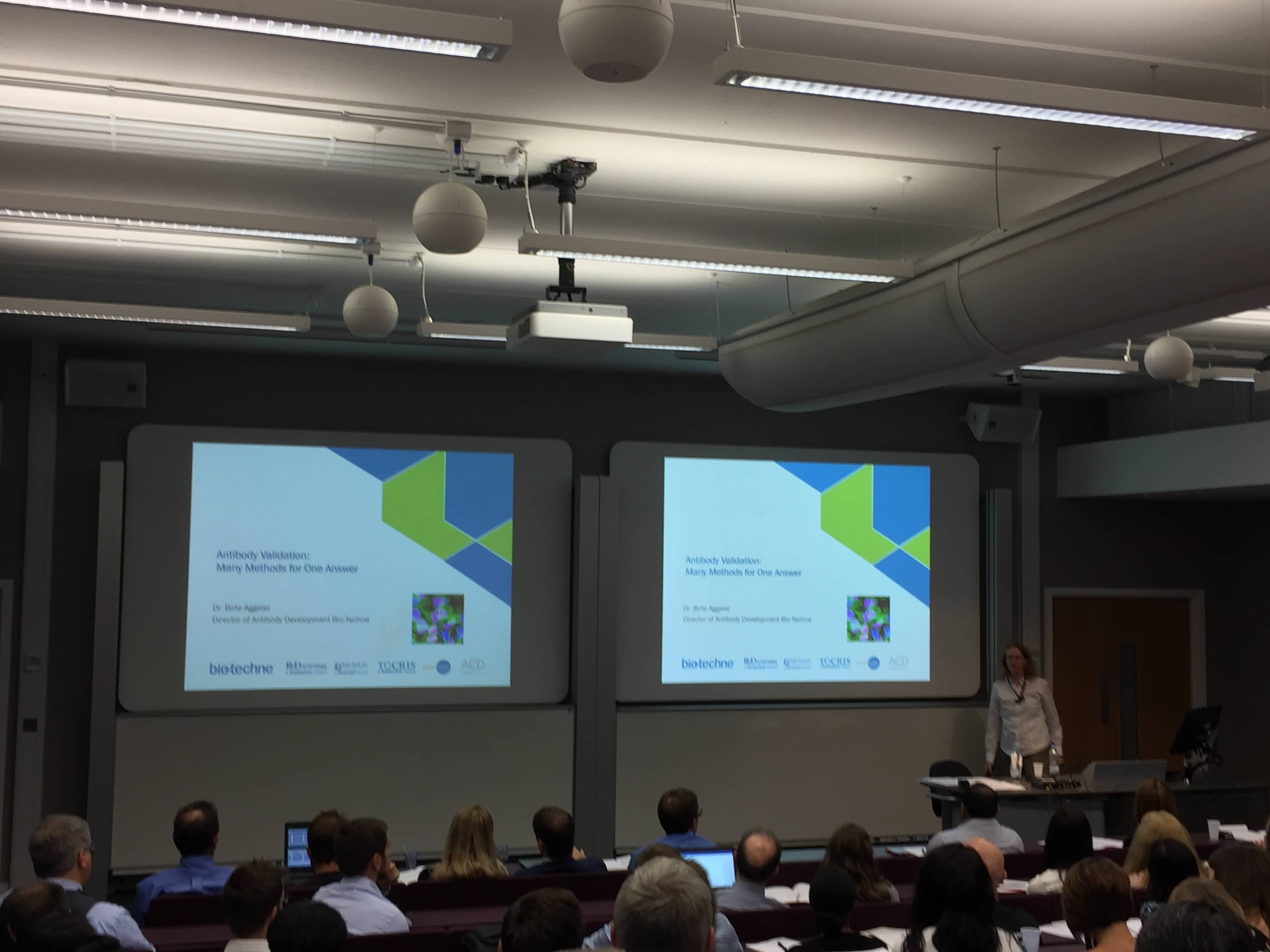Bio-Techne brands Novus Biologicals® and R&D Systems® were proud to support the 2nd International Antibody Validation Meeting held at Bath University, on the 15-16 September, 2016. Almost 100 participants from around the world, including funders, publishers, academics, pharma and antibody manufacturers were in attendance, to share and discuss best practices in research antibody validation and to drive improved antibody validation standards for the global life science community.
Five Pillars of Antibody Validation
Genetic Knockout (KO) Validation

Bio-Techne booth
Release of highly validated antibodies, and research reproducibility is an issue which we at Bio-Techne have taken seriously for the last 30 years. The meeting was a timely and ideal forum to share our decades of antibody development and validation experience, and stringent quality control criteria, with the rest of the industry and life science community.
At the meeting we were pleased to be able to release our new whitepaper: ‘R&D Systems Development of Validated Monoclonal Antibodies' with the research community, offering valuable insights into our industry-leading processes for producing reproducible, specific and sensitive antibodies. For more details, please visit our Development of Validated Monoclonal Antibodies page. During the poster session, we also presented the development story of a new anti-human/mouse FOXP3 monoclonal antibody using rabbit recombinant technology. To download the poster, please visit our Development of a New Mouse/Human FoxP3 Antibody using Rabbit Antibody Technology page.

Dr. Brite Aggeler, Director of Antibody Development at Bio-Techne, at her talk "Antibody Validation: Many Methods for One Answer."
Dr. Birte Aggeler, Director of Antibody Development at Bio-Techne gave a well-received talk entitled: "Antibody Validation: Many Methods for One Answer" outlining our multi-pronged approach to development and validation of an antibody, from concept to final released product. Dr Aggeler also addressed important questions such as antigen design, host species, application and specificity testing, lot-to-lot testing and how we ensure reproducibility for the lifetime of our products. Dr Aggeler shared examples of our standard antibody development process where we integrate and review validation data from different applications (such as Western blot, IHC, ICC/IF, Flow cytometry, Luminex, antibody arrays, blocking/neutralization and other functional assays), as well as an update on knockout validation studies using CRISPR gene editing technology with our partners at B-MoGen Bio-technologies.
We also collaborate with leading global experts in different research areas, from neuroscience, cancer, stem cells to immunology, and Dr Aggeler presented the case study of the development and validation of monoclonal antibodies for LGR5, in collaboration with Professor Hans Clevers at the Hubrecht Institute – one of the world leaders in normal stem cell development and regenerative medicine.
Members of the audience were also interested in Bio-Techne's approach and extremely high success rates in the recombinant conversion of traditional hybridoma derived monoclonal antibodies. For further details on this service, offered by R&D Systems, please visit our Recombinant Antibody Conversion page.
Following her presentation, Dr Aggeler also contributed to a panel discussion on antibody validation including the BBSRC (UK), Los Alamos National Laboratory (USA), PLOS (UK), Oslo University Hospital (Norway), F1000Research (UK), GlaxoSmithKline (UK) and other antibody manufacturers. Amongst the various discussion points, the exclusive adoption of sequence-defined recombinant antibodies in place of polyclonals and traditional monoclonals, as proposed by Andrew Bradbury from Los Alamos National Laboratory was discussed.
Bio-Techne is also a proud supporter of various global antibody validation and reproducibility initiatives from the Affinity Binder Knockdown Initiative, the Science Exchange Reproducibility Project: Cancer Biology, to the F1000Research Antibody Validation Channel, and it was a good opportunity to catch up with our partners at this meeting.
Overall, the meeting was a timely and ideal forum in allowing us to share our decades of antibody development and validation experience, and stringent quality control criteria, with the rest of the industry and life science community, and a useful prelude to the GBSI Antibody Validation Workshop at Asilomar, taking place this week. We would like to take the opportunity to thank the University of Bath, Andrew Chalmers, CiteAb and AstraZeneca for an outstanding meeting.
Have thoughts about antibody validation? Feel free to leave comments below!